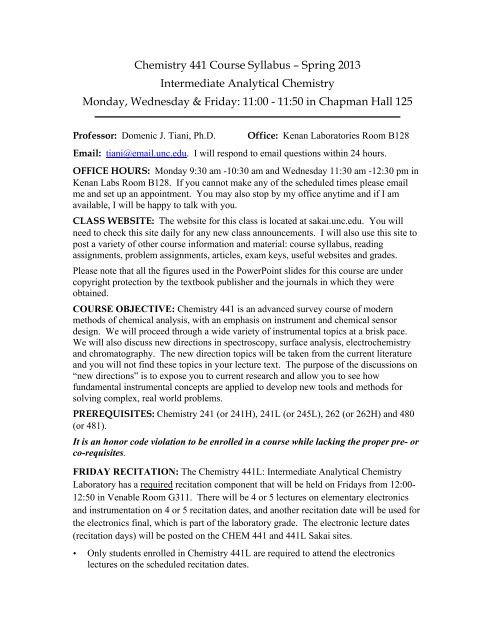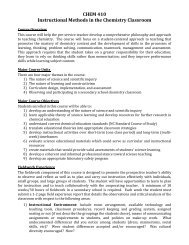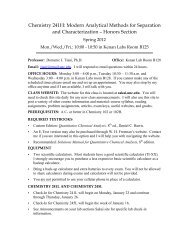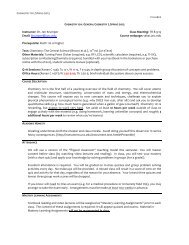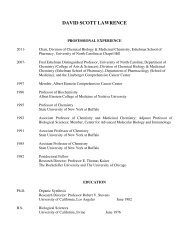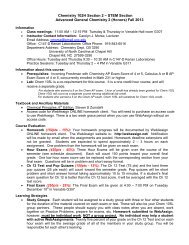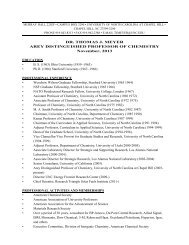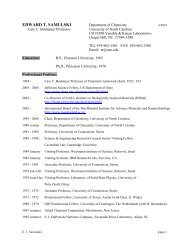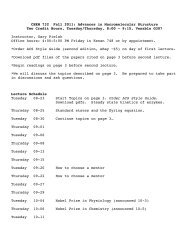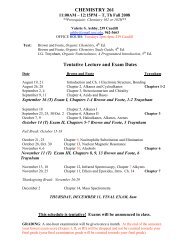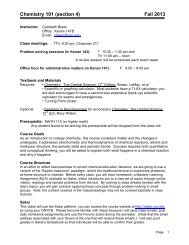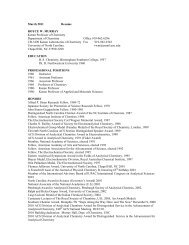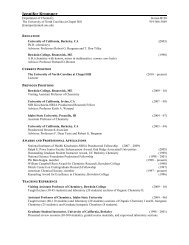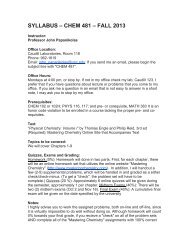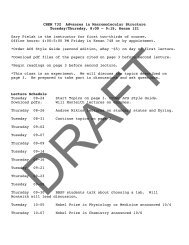Chemistry 441 Course Syllabus â Spring 2013 Intermediate ...
Chemistry 441 Course Syllabus â Spring 2013 Intermediate ...
Chemistry 441 Course Syllabus â Spring 2013 Intermediate ...
You also want an ePaper? Increase the reach of your titles
YUMPU automatically turns print PDFs into web optimized ePapers that Google loves.
<strong>Chemistry</strong> <strong>441</strong> <strong>Course</strong> <strong>Syllabus</strong> – <strong>Spring</strong> <strong>2013</strong><strong>Intermediate</strong> Analytical <strong>Chemistry</strong>Monday, Wednesday & Friday: 11:00 - 11:50 in Chapman Hall 125Professor: Domenic J. Tiani, Ph.D.Office: Kenan Laboratories Room B128Email: tiani@email.unc.edu. I will respond to email questions within 24 hours.OFFICE HOURS: Monday 9:30 am -10:30 am and Wednesday 11:30 am -12:30 pm inKenan Labs Room B128. If you cannot make any of the scheduled times please emailme and set up an appointment. You may also stop by my office anytime and if I amavailable, I will be happy to talk with you.CLASS WEBSITE: The website for this class is located at sakai.unc.edu. You willneed to check this site daily for any new class announcements. I will also use this site topost a variety of other course information and material: course syllabus, readingassignments, problem assignments, articles, exam keys, useful websites and grades.Please note that all the figures used in the PowerPoint slides for this course are undercopyright protection by the textbook publisher and the journals in which they wereobtained.COURSE OBJECTIVE: <strong>Chemistry</strong> <strong>441</strong> is an advanced survey course of modernmethods of chemical analysis, with an emphasis on instrument and chemical sensordesign. We will proceed through a wide variety of instrumental topics at a brisk pace.We will also discuss new directions in spectroscopy, surface analysis, electrochemistryand chromatography. The new direction topics will be taken from the current literatureand you will not find these topics in your lecture text. The purpose of the discussions on“new directions” is to expose you to current research and allow you to see howfundamental instrumental concepts are applied to develop new tools and methods forsolving complex, real world problems.PREREQUISITES: <strong>Chemistry</strong> 241 (or 241H), 241L (or 245L), 262 (or 262H) and 480(or 481).It is an honor code violation to be enrolled in a course while lacking the proper pre- orco-requisites.FRIDAY RECITATION: The <strong>Chemistry</strong> <strong>441</strong>L: <strong>Intermediate</strong> Analytical <strong>Chemistry</strong>Laboratory has a required recitation component that will be held on Fridays from 12:00-12:50 in Venable Room G311. There will be 4 or 5 lectures on elementary electronicsand instrumentation on 4 or 5 recitation dates, and another recitation date will be used forthe electronics final, which is part of the laboratory grade. The electronic lecture dates(recitation days) will be posted on the CHEM <strong>441</strong> and <strong>441</strong>L Sakai sites.• Only students enrolled in <strong>Chemistry</strong> <strong>441</strong>L are required to attend the electronicslectures on the scheduled recitation dates.
• The <strong>Chemistry</strong> <strong>441</strong>L lab grade is separate from the <strong>Chemistry</strong> <strong>441</strong> lecture grade.REQUIRED TEXTBOOKS• Skoog, Douglas A.; Holler, James; Crouch, Stanley R. Principles of InstrumentalAnalysis, 6 th ed.; Thomson Brookes/Cole: CA, 2007.EQUIPMENT• Two scientific calculators. Most students have a good scientific calculator (TI-XX),but I strongly recommend that you also purchase a less expensive basic scientificcalculator to serve as a back up.• Bring extra calculator batteries to every exam. You will not be allowed to sharecalculators during exams and calculators will not be provided.• You are not permitted to use your cellular phone in place of a calculator.CHEMISTRY <strong>441</strong>L• There will be a required organizational meeting on Friday, January 18 from 12:00-12:50 in Venable Room G311 for all students enrolled in <strong>Chemistry</strong> <strong>441</strong>L.• Experimental work for <strong>Chemistry</strong> <strong>441</strong>L will begin the week of January 28.• The laboratory component of this course is independent of the lecture.ATTENDANCE• Regular attendance is important to your ability to succeed in this class.• I understand that sometimes you may need to miss class. In these circumstances, talkto a fellow classmate to obtain the class notes and come see me if you have questionsregarding the material you missed.• Please be punctual to class and exams.HOMEWORK• Problems from the end of the chapter will be assigned for you to work after eachlecture. Work the problems as the material is covered in class.• Avoid putting off working the assigned problems until the right before the exam. It isbest to give yourself time to work through the problems and really think about thematerial.• All the problem and reading assignments will be posted on Sakai under the“Assignments” tab.• Problem assignments are meant to reinforce your understanding of the lecturematerial and they will not be graded.• Try to avoid working problems to simply come up with an answer, focus onunderstanding the concepts behind each problem.GRADED HOMEWORK: There will be 3 graded homework assignments throughoutthe semester, one before each regular semester exam. The graded homework assignmentswill be announced beforehand in class. Some of the graded homework questions will
involve getting into the pertinent literature surrounding a topic and other questions willinvolve applying what you have learned in class to more in depth, multifaceted problemsand questions.EXAMS• Three semester exams will be given on the following dates.Exam 1: Monday, 2/4Exam 2: Friday, 3/1Exam 3: Monday, 4/8• The Final Exam is scheduled for Friday, May 3 from 8:00 am – 11:00 am inChapman Hall Room 125.• The final exam will cover separations (separation theory, separation methods and newdirections). In addition, there will be questions that will require you to applyconcepts that you have learned throughout the semester.GRADES: Your final grade in this course will be based on three 1-hour exams, 5 inclass quizzes, 3 graded homework assignments and a final exam.3 Semester Exams (100 points each) 300 points5 Quizzes – In Class (10 points each) 50 points3 Graded Homework Assignments (20 points each) 60 pointsFinal Exam – Cumulative150 pointsTotal560 points• There will be no make-up examinations except in the event of extraordinarycircumstances such as serious illness or family emergency. Other circumstances willbe handled on a case-by-case basis.• The letter grades for the course will be determined based on your overall percentagefrom the three 1-hour exams, quizzes, homework and the final. Letter grades will beassigned using the below cutoffs. Depending on the overall class average,adjustments may be made to student grades at the end of the semester.Final AverageLetter Grade93.0-100 A90.0 – 92.9 A-87.0 – 89.9 B+83.0 – 86.9 B80.0 – 82.9 B-74.0 – 79.9 C+66.0 – 73.9 C60.0 – 65.9 C-50.0 – 59.9 D< 50.0 F
QUIZZES: There will be 5 in class quizzes over the course of the semester. The dates ofthe quizzes will be announced one lecture beforehand. Quiz questions may involvecalculations, problem solving, and/or more conceptual type questions.HONOR CODE: Policy adopted by the faculty of the Department of <strong>Chemistry</strong> onSept. 9, 1977:“Since all graded work (including homework to be collected, quizzes, papers, mid-termexaminations, final examinations, research proposals, laboratory results and reports,etc.) may be used in the determination of academic progress, no collaboration on thiswork is permitted unless the instructor explicitly indicates that some specific degree ofcollaboration is allowed. This statement is not intended to discourage students fromstudying together or working together on assignments which are not to be collected.”CLASS SCHEDULE: Below is a tentative class schedule for the semester. You shouldnote that this schedule is subject to change. Any changes will be announced ahead oftime in class.• Specific reading assignments will be posted on Sakai before each lecture.• Class will be canceled a number of times throughout the semester to compensate forthe fact that this is a 2 credit hour class.• The “New Direction” topics will be taken from the current literature. I will provideyou the supplementary information and material before each of these lectures.DATE DAY TOPIC1/9 Wednesday Introduction: Chapter 1Friday Recitation(12:00-12:50)1/11 Friday Signals and Noise: Chapter 5 Electronics Lecture1/14 Monday Spectroscopy1/16 Wednesday Spectroscopy1/18 Friday Spectroscopy Lab Orientation Meeting1/21 Monday Martin Luther King Jr. Day - NO CLASS1/23 Wednesday Spectroscopy – New Directions1/25 Friday Spectroscopy Electronics Lecture1/28 Monday Spectroscopy1/30 Wednesday Spectroscopy2/1 Friday Q & A Electronics Lecture2/4 Monday Exam 12/6 Wednesday Mass Spectrometry2/8 Friday Mass Spectrometry Electronics Lecture2/11 Monday Mass Spectrometry2/13 Wednesday No Class2/15 Friday Surface Analysis Electronics Lecture
2/18 Monday Surface Analysis2/20 Wednesday No Class2/22 Friday Surface Analysis Electronics Exam2/25 Monday Surface Analysis – New Directions2/27 Wednesday Q & A3/1 Friday Exam 23/4 Monday Introduction to Electroanalytical <strong>Chemistry</strong>3/6 Wednesday Electroanalytical <strong>Chemistry</strong> and Potentiometry3/8 Friday No Class3/11 Monday SPRING BREAK - NO CLASS3/13 Wednesday SPRING BREAK - NO CLASS3/15 Friday SPRING BREAK - NO CLASS3/18 Monday No Class3/20 Wednesday Potentiometry3/22 Friday Coulometry3/25 Monday Coulometry and Voltammetry3/27 Wednesday Voltammetry3/29 Friday Good Friday - No Class4/1 Monday Electroanalytical <strong>Chemistry</strong> – New Directions4/3 Wednesday Separations4/5 Friday Q & A4/8 Monday Exam 34/10 Wednesday No Class4/12 Friday Separations4/15 Monday Separations4/17 Wednesday Separations4/19 Friday Separations4/22 Monday No Class4/24 Wednesday Separations4/26 Friday Separations – New Directions


